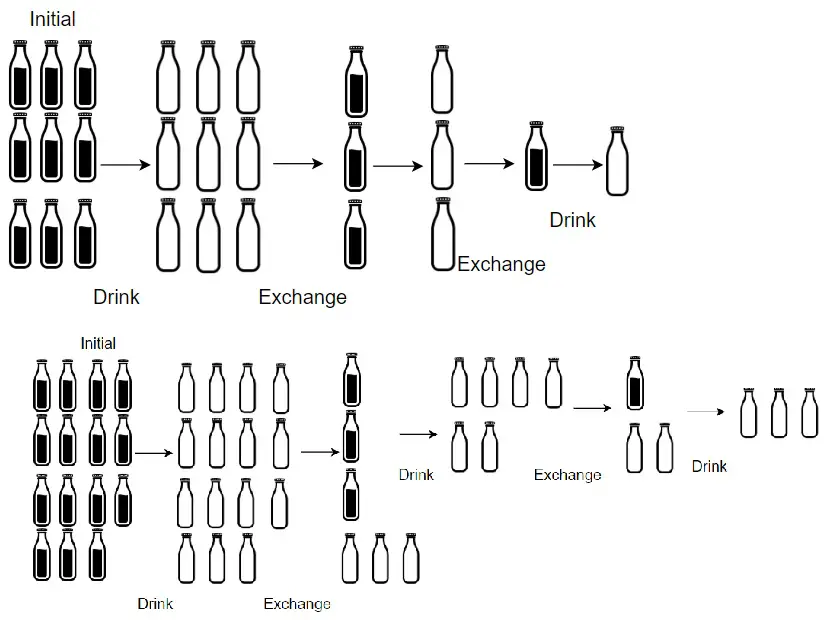Simulation Algorithm to Compute the Number of Water Bottles
- 时间:2020-10-11 15:17:18
- 分类:网络文摘
- 阅读:111 次
Given numBottles full water bottles, you can exchange numExchange empty water bottles for one full water bottle. The operation of drinking a full water bottle turns it into an empty bottle. Return the maximum number of water bottles you can drink.
simulation-algorithm-water-bottles
Example 1:
Input: numBottles = 9, numExchange = 3
Output: 13
Explanation: You can exchange 3 empty bottles to get 1 full water bottle.
Number of water bottles you can drink: 9 + 3 + 1 = 13.Example 2:
Input: numBottles = 15, numExchange = 4
Output: 19
Explanation: You can exchange 4 empty bottles to get 1 full water bottle.
Number of water bottles you can drink: 15 + 3 + 1 = 19.Example 3:
Input: numBottles = 5, numExchange = 5
Output: 6Example 4:
Input: numBottles = 2, numExchange = 3
Output: 2Constraints:
1 <= numBottles <= 100
2 <= numExchange <= 100
Exchanging Bottles Simulation Algorithm
This is a classic problem to apply the simulation algorithm. If empty bottoes are enough for a exchange, we keep doing this until we can’t exchange for a single bottle. The pitfall is that we have to add the remainder to the next rounds’ emtpy counters.
1 2 3 4 5 6 7 8 9 | class Solution: def numWaterBottles(self, numBottles: int, numExchange: int) -> int: ans = numBottles empty = numBottles while empty >= numExchange: newBottles = empty // numExchange ans += newBottles empty = newBottles + empty % numExchange return ans |
class Solution:
def numWaterBottles(self, numBottles: int, numExchange: int) -> int:
ans = numBottles
empty = numBottles
while empty >= numExchange:
newBottles = empty // numExchange
ans += newBottles
empty = newBottles + empty % numExchange
return ans C/C++/Java-style solutions are like:
1 2 3 4 5 6 7 8 9 10 11 12 | class Solution { public int numWaterBottles(int numBottles, int numExchange) { int ans = numBottles; int empty = numBottles; while (empty >= numExchange) { int newBottles = empty / numExchange; ans += newBottles; empty = newBottles + empty % numExchange; } return ans; } } |
class Solution {
public int numWaterBottles(int numBottles, int numExchange) {
int ans = numBottles;
int empty = numBottles;
while (empty >= numExchange) {
int newBottles = empty / numExchange;
ans += newBottles;
empty = newBottles + empty % numExchange;
}
return ans;
}
}–EOF (The Ultimate Computing & Technology Blog) —
推荐阅读:How to Determine the Armstrong Number? Facebook Recommends Psychiatrist’s Friends Connect, Completely V 3 Link Building Methods Every Blogger Should Be Using 3 Types of Sticky Content Bloggers Should Be Using The Basics of Building an SEO-Friendly Site with Wix Social Media Image Sizes Cheat Sheet for 2016 The Blogging Evolution: From Hobby To Marketing Tool We Want Plates! Food Blogger Criticizes Quirky Food Serving Tren Company Blog Tips: How To Keep Your Company Blog Out Of A Rut 10 Tips to Humanize Your Company Blog
- 评论列表
-
- 添加评论
